
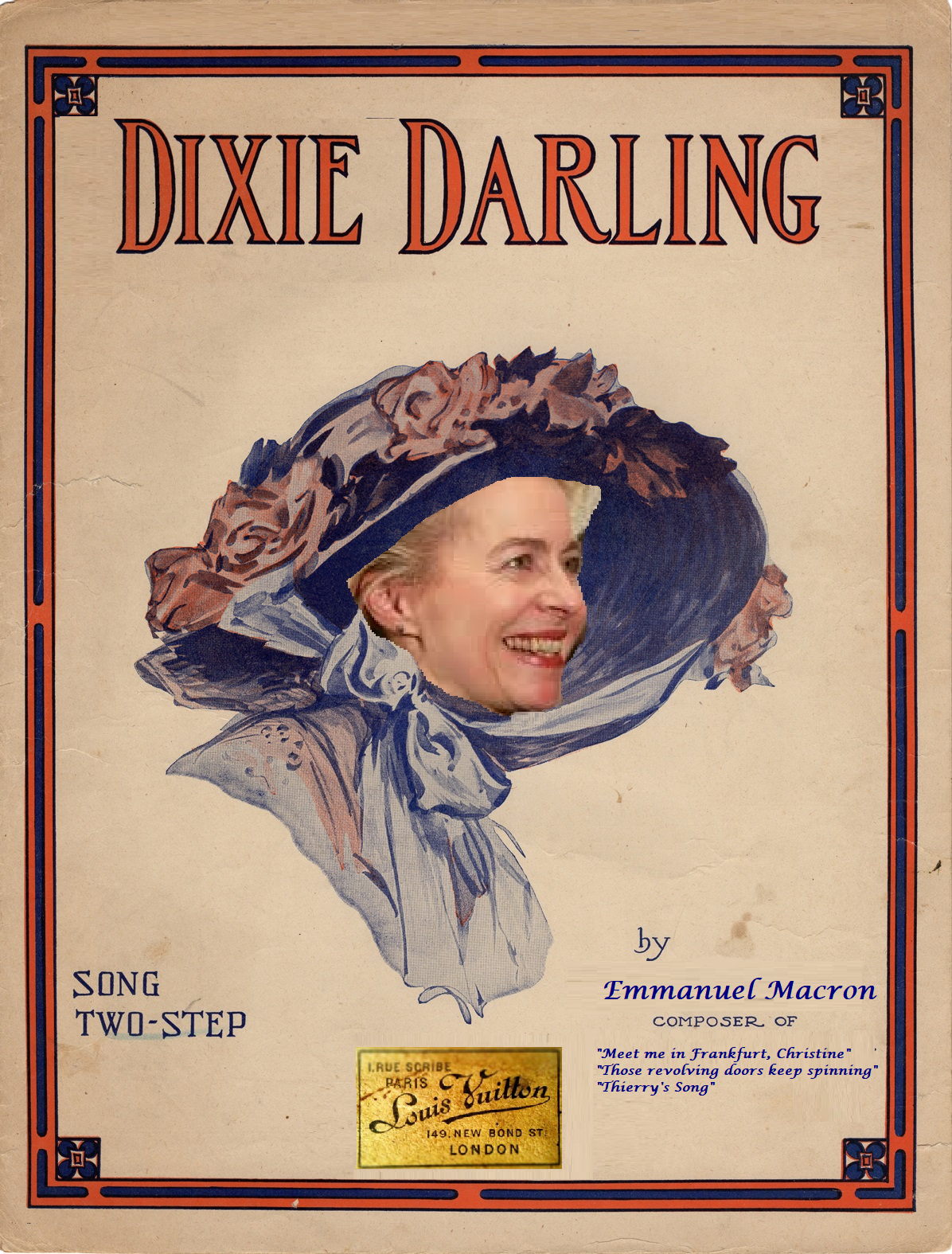
Despite all the cotton-pickin' criticism of her domestic track record in Germany, Macron's Dixie Darling, Miss Ladson, managed to get through the EU vetting procedure with a slim majority
As we saw in the last part, Thierry Breton is not the only "joker" that French President Emmanuel Macron has up his sleeve for the political poker games in the backrooms of the EU Commission in Brussels.
"In this rôle he or she is instrumental in shaping policy for the world’s biggest trade bloc and its 500 million citizens."The head of the Commission is responsible for leading the body which supervises EU states’ budgets, acts as the bloc’s competition watchdog and conducts trade negotiations with outside countries. In this rôle he or she is instrumental in shaping policy for the world’s biggest trade bloc and its 500 million citizens.
Ursula von der Leyen's family name is Albrecht. The Albrechts are a prominent North German family many of whose members have made a name for themselves as civil servants, politicians and business people.
Uschi's father was Ernst Albrecht, a German politician of the centre-right CDU and a former high-ranking European civil servant. Her brother Hans-Holger Albrecht who resides mainly in London is the CEO of Deezer, a French company headquartered in Paris which provides online music streaming services worldwide.
"The Albrechts are a prominent North German family many of whose members have made a name for themselves as civil servants, politicians and business people."One of Uschi's great-grandmothers was Mary Ladson Robertson who was born in Charleston in South Carolina, in 1883 but moved to Bremen in the early 1900s after marrying Friedrich Carl Albrecht, in 1902. Carl Albrecht as he was usually known, was the son of the wealthy cotton merchant George Alexander Albrecht (1834–1898) and Louise Dorothea Betty Knoop (1844–1889), the daughter of the major industrialist, Baron Ludwig Knoop, one of the most successful entrepreneurs of the 19th century Russian Empire.
The Ladsons were of English descent and became one of South Carolina's most prominent planter and merchant families during the late 17th century. They played a major role in the British colonization of the Americas and in the slave trade in British North America. The town of Ladson in South Carolina is named in honour of the family.
James Henry Ladson (1753 – 1812) was an American politician, wealthy plantation owner from Charlestown and an officer of the American Revolution.
"They played a major role in the British colonization of the Americas and in the slave trade in British North America."His great-grandfather, John Ladson, emigrated from Northamptonshire in England to Barbados and then to Carolina as one of the first English settlers in 1679, where he built a large plantation and served in the Commons House of Assembly from 1685. James Ladson served as the Lieutenant Governor of South Carolina from 1792 to 1794, and was a member of the South Carolina state Senate from 1800 to 1804.
His wife, Judith Smith (1762–1820), belonged to one of South Carolina's wealthiest banker-merchant families and was a granddaughter of Joseph Wragg, one of the pioneers of the large-scale Atlantic slave trade in the British colonies in North America in the 18th century and the predominant British North American slave transporter and trader in the 1730s.
Their son, James H. Ladson junior, pursued a career in the rice and cotton business. His main properties were the La Grange and Fawn Hill plantations beside the North Santee River in Georgetown County which produced around 600,000 pounds of rice each year. He also maintained a town house in Charleston where he lived for much of the year together with a dozen or so slaves to attend to their every whim. Ladson owned over 200 slaves by 1850 and was an integral part of the oligarchy of planters and merchants which dominated the political and business life of Charleston during the antebellum era.
"It was the only major antebellum American city to have a majority slave population which is a reflection of its close links with the slave trade, one of the main sources of its wealth."Charleston was founded in 1670 as Charles Town, honoring King Charles II of England and was one of the first British settlements during the initial colonisation of the Americas. By the 1840 census, it was among the ten largest cities in the United States. It was the only major antebellum American city to have a majority slave population which is a reflection of its close links with the slave trade, one of the main sources of its wealth.
Historians estimate that "nearly half of all Africans brought to America arrived in Charleston". Independent slave traders based in Charleston like Ladson's maternal ancestor Joseph Wragg broke the monopoly of the Royal African Company during the colonial era, and after the War of Independence, came to dominate the slave trade in the United States.
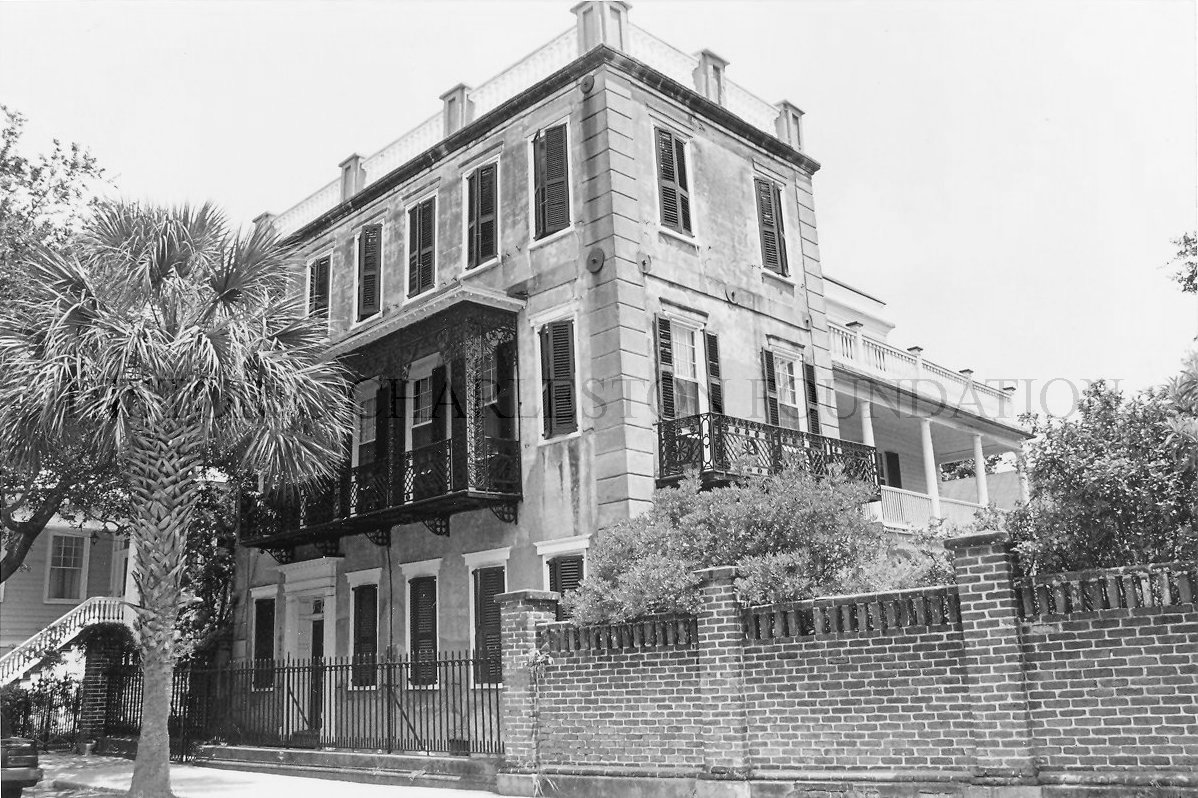
"Tucker House", the Ladsons' town house in Charleston including room for a dozen or so slaves
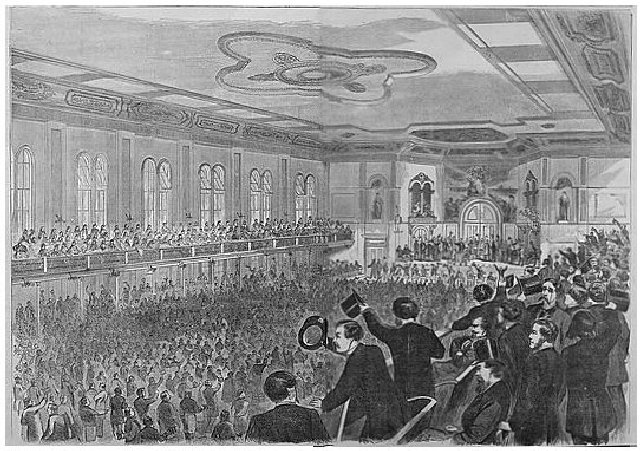
Von der Leyens's American ancestors, the Ladsons, were members of the slave-owning plantocracy whose push for secession from the Union ultimately led to civil war
"It was the only major antebellum American city to have a majority slave population which is a reflection of its close links with the slave trade, one of the main sources of its wealth."Soon afterwards, six other plantocracy-dominated states (Georgia, Mississippi, Florida, Alabama, Louisiana and Texas) followed the lead of South Carolina and the seven secessionist states joined forces as the Confederate States of America.
The first shots of the Civil War were fired in Charleston Harbour on 12 April 1861 when the South Carolina Militia bombarded Fort Sumter after the Union garrison refused to vacate it.
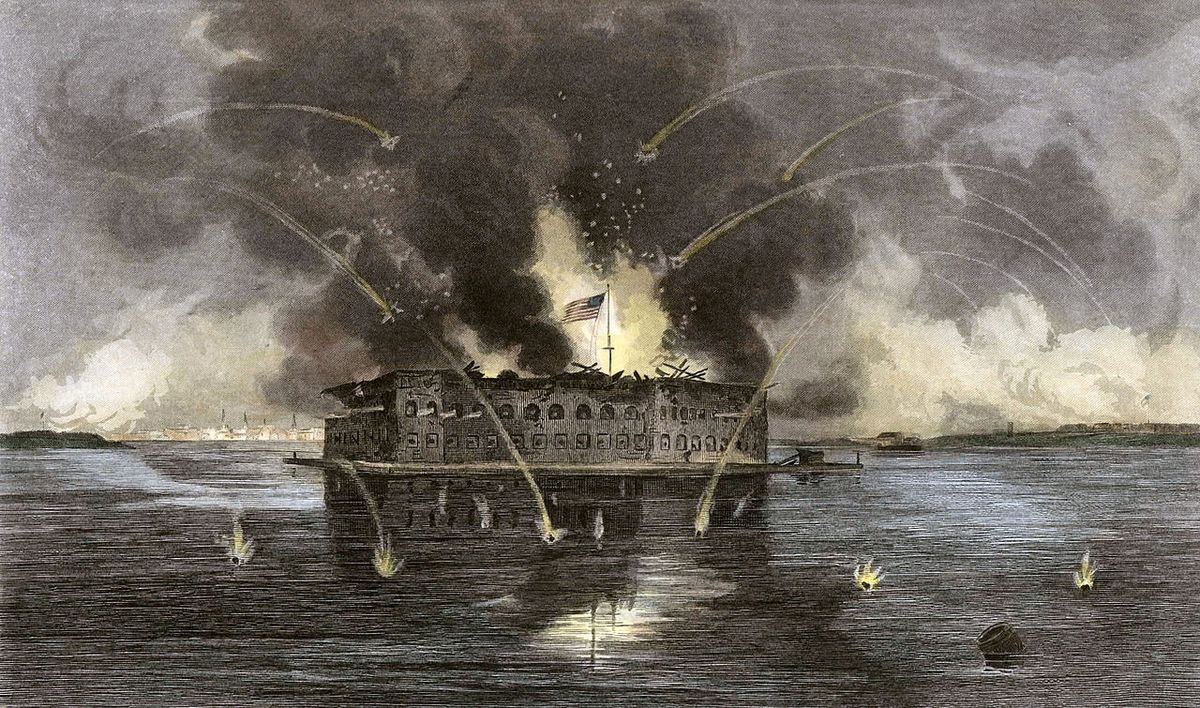
Bombardment of Fort Sumter April 1861 – the first shots of the American Civil War
"By 1763, the family employed half of Krefeld's population of just over 6,000 in their factories and they became major players in the commercial life of German..."In 1828, the von der Leyen family had the dubious distinction of "hosting" what Karl Marx called the first workers' uprising in German history when the silk weavers at their factories rose up in protest against wage cuts.
According to one contemporary report: "Accompanied by a drum and with flag in front, they marched through the streets in significant number, singing and making noise. There were 2000 of them. They passed by the houses of the factory owners von der Leyen, de Greiff, Scheibler, Heidweiler and others - all names that are otherwise mentioned only with deference in the history of the Silk City [Krefeld] - and smashed their windows."
"In 1828, the von der Leyen family had the dubious distinction of "hosting" what Karl Marx called the first workers' uprising in German history when the silk weavers at their factories..."Before the situation escalated, the 11th Hussar Regiment of the Prussian Army was called in to "restore order". Although Marx considered the incident to be of historical significance, it's almost impossible to find any details about it today and it seems to have been well and truly buried in the annals of local folklore in the Rhineland.
But let's get back to Ursula von der Leyen.
"Uschi" was born in Brussels as one of eight children. Her father Ernst Albrecht was one of the first European civil servants appointed in 1958 and he served as head of the EU Directorate-General for Competition from 1967 to 1970. He later held the position of First Minister of the German state of Lower Saxony from 1976 to 1990.
When she was 13, the family moved to Germany, where Uschi studied economics at the University of Göttingen.
In 1978 she reportedly went into hiding in London after her family were informed by police that the far-left militant group, the Rote Armee Fraktion (RAF) was planning to kidnap her in order to extort her father. The tip-off was taken seriously because the RAF was believed to enjoy a certain level of support among the student population of Göttingen.
"While London she lived under the pseudonym "Rose Ladson" which she adopted in a act of homage to her ancestors from the South Carolina plantocracy..."During her temporary "exile" in the home of Big Ben, Uschi studied at the London School of Economics. Not only did she use the "gap year" to polish up her English, it seems that she also availed of the opportunity get in touch with her inner "Dixie Chick".
While London she lived under the pseudonym "Rose Ladson" which she adopted in a act of homage to her ancestors from the South Carolina plantocracy, in particular her great-grandmother Mary Ladson Robertson.
After the RAF threat had subsided, "Little Miss Ladson" returned to Germany in 1979 and switched to medical studies, eventually becoming Dr von der Leyen.
She then moved into politics on her father's coat-tails, serving her apprenticeship at local level in Lower Saxony before moving to the federal government in 2005 where she developed into a trusted ally of the German Prime Minister, Angela Merkel.

Keeping it in the family - CDU recruitment poster showing Uschi and Ernst Albrecht

Von der Leyen's track record as Defence Minister earned her the title "Miss Management"
"Von der Leyen's track-record as Defence Minister earned her the title of "Miss Management" along with other nicknames..."In June 2019, shortly before her nomination for the EU Commission post, her Ministry hit the headlines again following a crash between two German Eurofighter jets during a military exercise which resulted in the death of one pilot. A year previously, a report published in the current affairs magazine Der Spiegel had claimed that only a handful of the German Air Force's 128 Eurofighter jets were combat-ready due to technical problems.
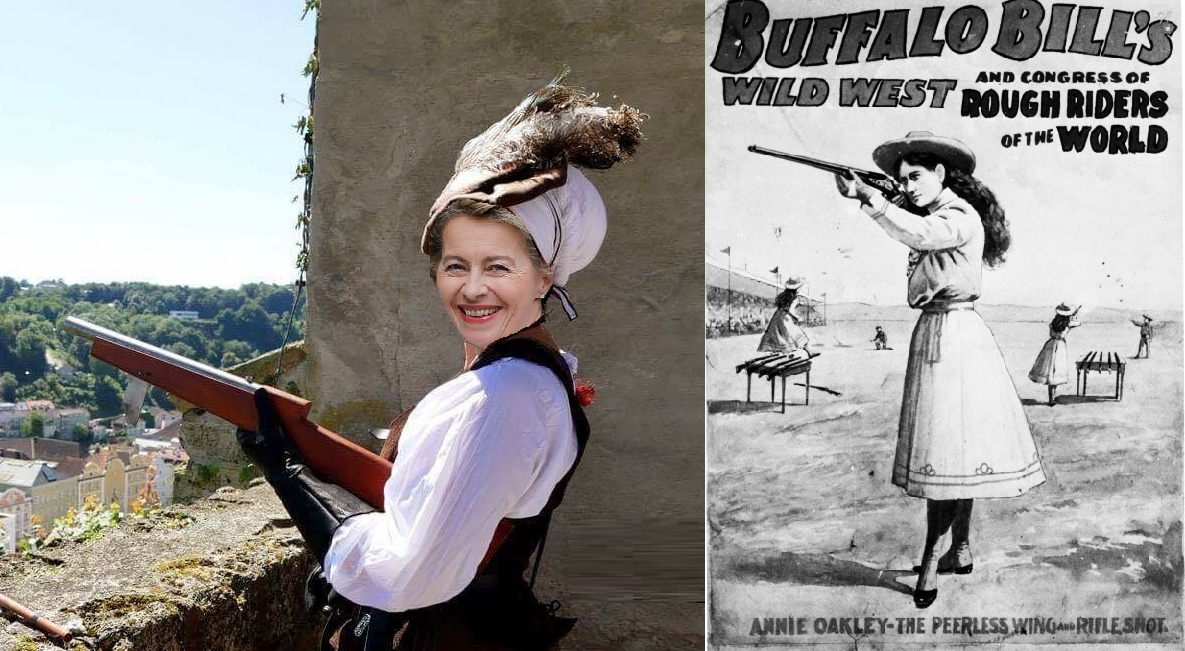
"Flinten-Uschi" – Germany's answer to Miss Sureshot Annie Oakley?
"Her political future on the domestic stage in Germany was beginning to look increasingly shaky, so the Brussels nomination came at an extremely opportune time for her."The nomination also suited her proposer Macron because it provided him with an ally who spoke fluent French from her early years in Brussels and was open to French ideas on EU reform, particular in the areas of defence and economic integration.
Although von der Leyen's nomination was publicly endorsed by the CDU party leadership, the Financial Times reported that her selection provoked widespread bemusement in Germany even within the ranks of her own party.
"Mistrusted by her fellow Christian Democrats, pilloried by the opposition and disliked by many of the generals under her command, she cuts a lonely figure in Berlin. Few ministries have generated as many negative headlines as hers over the years. Yet she has now been named to one of the most powerful jobs in Europe."

The CDU officially endorsed Uschi's nomination as head of the EU Commission

Former European Parliament chairman, Martin Schulz, was not amused
"The former European Parliament chairman Martin Schulz could barely conceal his disgust at the news noting that she was "the weakest minister in the [German] government" and bemoaning the fact that "such a performance suffices to become head of the [EU] commission.""However, despite trenchant criticism from the Social Democratic and Green blocs, her nomination was rubber-stamped by the European Parliament on 16 July 2019 by a slim majority: 383 out of 747 votes.

Satirical press reaction to von der Leyen's EU appointment.
"Hi there, I'm the new arrival! My name is Uschi – Flinten-Uschi"
In the background a stag responds: "And I'm Bond – James Bond"